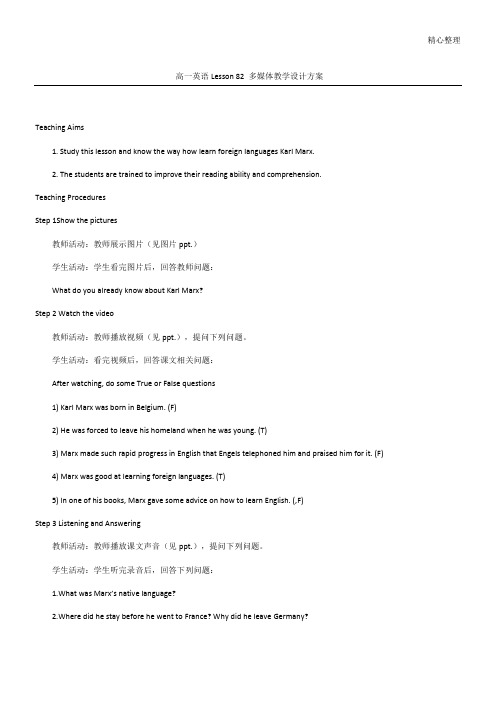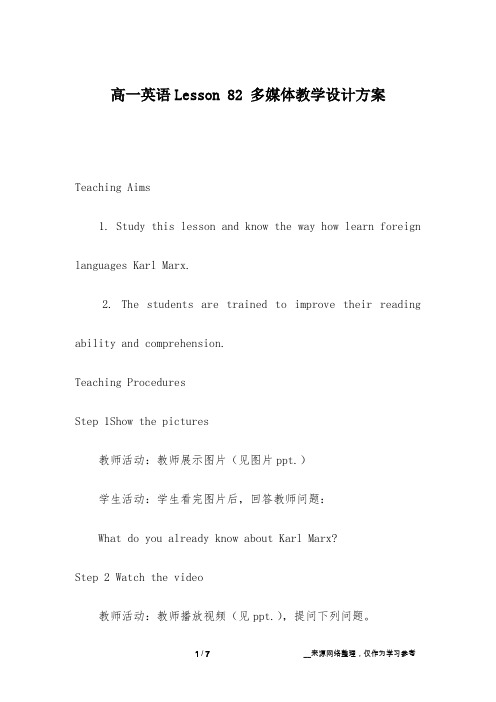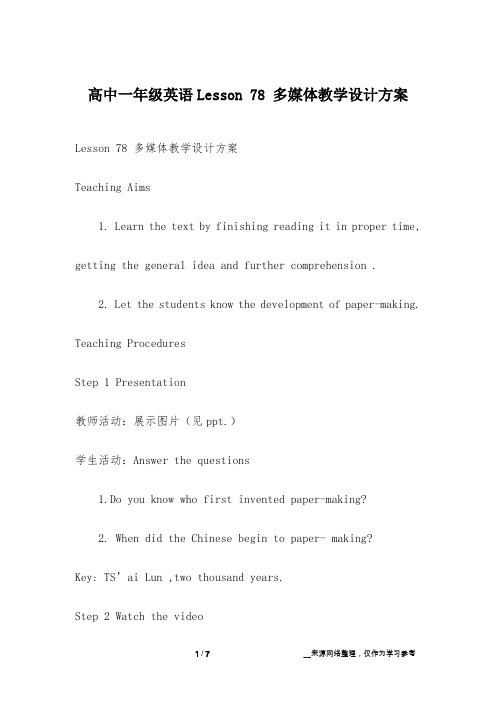高一英语Lesson 87多媒体教学设计方案
- 格式:docx
- 大小:15.27 KB
- 文档页数:2

高一英语多媒体教学设计方案高一英语多媒体教学设计方案模板高一英语多媒体教学设计方案Teaching Aims1. Study this lesson and know the way how learn foreign languages Karl Marx.2. The students are trained to improve their reading ability and comprehension.Teaching ProceduresStep 1Show the pictures教师活动:教师展示图片(见图片ppt.)学生活动:学生看完图片后,回答教师问题:What do you already know about Karl Marx?Step 2 Watch the video教师活动:教师播放视频(见ppt.),提问下列问题。
学生活动:看完视频后,回答课文相关问题:After watching, do some True or False questions1) Karl Marx was born in Belgium. (F)2) He was forced to leave his homeland when he was young. (T)3) Marx made such rapid progress in English that Engels telephoned him and praised him for it. (F)4) Marx was good at learning foreign languages. (T)5) In one of his books, Marx gave some advice on how to learn English. (,F)Step 3 Listening and Answering教师活动:教师播放课文声音(见ppt.),提问下列问题。

精心整理高一英语Lesson 82 多媒体教学设计方案Teaching Aims1. Study this lesson and know the way how learn foreign languages Karl Marx.2. The students are trained to improve their reading ability and comprehension.Step 3 Listening and Answering教师活动:教师播放课文声音(见ppt.),提问下列问题。
学生活动:学生听完录音后,回答下列问题:1.What was Marx’s native language?2.Where did he stay before he went to France? Why did he leave Germany?3.What did he do with his English later on?4.When did Marx start learning Russian? Why?5.How long did it take him to learn Russian well enough to read articles?6.What advice did Marx give on how to learn a foreign language?Suggest answers:1.German was his native language.P2—Read the passages in Lesson 82,Write notes in the spaces below:Name :Karl Marx Born:___________as a young man :_____________________________________________________________ wrote books :_________________________in 1849 :____________________________________________________________later:_____________________________________________________________in 1853 :____________________________________________________________later :__________________________________ in the 1870s :____________________________Key: was born in Germany; was forced to leave his homeland for political reasons; went to Belgium and France.; The Civil War in France; went to England; made London the base for his revolutionary work; started working hard to improve his English; made rapid progress; wrote articles in English; was praised; was encouraged; was not sure about two things; kept on studying and using English; began to learn Russian; read articles and reports in RussianStep 6 Exercise。

高一英语Lesson 82 多媒体教学设计方案Teaching Aims1. Study this lesson and know the way how learn foreign languages Karl Marx.2. The students are trained to improve their reading ability and comprehension.Teaching ProceduresStep 1Show the pictures教师活动:教师展示图片(见图片ppt.)学生活动:学生看完图片后,回答教师问题:What do you already know about Karl Marx?Step 2 Watch the video教师活动:教师播放视频(见ppt.),提问下列问题。
学生活动:看完视频后,回答课文相关问题:After watching, do some True or False questions1) Karl Marx was born in Belgium. (F)2) He was forced to leave his homeland when he was young. (T)3) Marx made such rapid progress in English that Engels telephoned him and praised him for it. (F)4) Marx was good at learning foreign languages. (T)5) In one of his books, Marx gave some advice on how to learn English. (,F)Step 3 Listening and Answering教师活动:教师播放课文声音(见ppt.),提问下列问题。
学生活动:学生听完录音后,回答下列问题:1.What was Marx’s native language?2.Where did he stay before he went to France? Why did heleave Germany?3.What did he do with his English later on?4.When did Marx start learning Russian? Why?5.How long did it take him to learn Russian well enough to read articles?6.What advice did Marx give on how to learn a foreign language?Suggest answers:1.German was his native language.2.He stayed in Belgium, for political reasons.3.He began to study Russian.4.He’s already fifties, he found it important to study the situation in Russia.5.At the end of six months he had learned enough to read articles and reports in Russian.6.should not translate everything into their own language, master then use it, learn the spirit of the foreign language . Step 4 Listening Again教师活动:教师播放课文的段落声音(见ppt.),提问学生每段含意。

高一英语多媒体教学设计方案高一英语多媒体教学设计方案Teaching Aims(1) Study this lesson to know more about Britain.(2)The students are trained to improve their reading ability.(3) Learn about the language points concerned with the lesson.Teaching proceduresStep 1 Presentation教师活动:教师展示大不列颠地图,(见ppt.)然后进行设问,教师让学生积极参与,课堂气氛活跃。
学生活动:学生看着地图,找出问题的答案。
Show the Britain map then find out the position of the countries.1.Where is Britain?2.Where is England, Scotland, Ireland, Wales?Step 2 Watch the Video教师活动:教师演示课文视频(见ppt.),并且给学生简易地图,学生能够找出各个国家及首都的位置。
教师提问各别学生。
学生活动:学生通过简易地图,说出并且找出各个国家及首都的位置。
Fill the countries on the map.England, Scotland, Wales, Northern Ireland, Republic of Ireland, Dublin, Edinburgh, Belfast, Cardiff and London.Step 3 Listening教师活动:教师把本课的'几部分内容进行精听,播放各段声音文件(见ppt.)播放一遍后,给学生问题进行回答,之后教师进行总结并且展示各个国家的地图(见ppt.)学生活动:学生听完录音后,回答下面的问题。

Lesson 78 多媒体教学设计方案教学目标:掌握过去进行时态的用法教学设计过程:Step 1 Revision(学生活动)利用图片或照片复习过去进行时的用法。
(录像演示)通过情景复习过去进行时表达一个过去某个时间所发生的动作。
Step 2 Listening(声音课件展示)让学生边听边完成听力练习Step 3 Read and say(学生活动)根据不同的职业特点,让学生选择最好的答案来回答警察的问话。
(录像演示)情景演示警察调查案件时询问每个人的情景,运用过去进行时来表达当时发生的动作。
观看后教师可让学生写对话并表演出来。
(学生活动)提供一个案情,让学生来表演过程。
Here is another situation for the students to practise. A very famous drawing was stolen in the art gallery last night. You are trying to find out wh o did that. You can ask the question “What were you doing at nine o’clock last night?” After everyone has answered the question, the class discuss together, “Who do you think stole the painting from the gallery? Why?”Step 4 Read and talkRead the table about what David was doing at different times yesterday, then ask and answer in pairs.MorningAfternoonNight8:008:559:4510:1011:0512:00EnglishChineseMorning exercisesPhysicsBiologyLunch1:302:253:305:006:00MusicPEPlay basketballSwimSupper7:008:009:009:3010:30Watch TVWrite a letterPlay computer gamesRead newspaperGo to sleep(录像演示)情景演示询问过去某个时间点正在进行的动作,看后让学生进行模仿练习。

高中一年级英语Lesson 78 多媒体教学设计方案Lesson 78 多媒体教学设计方案Teaching Aims1. Learn the text by finishing reading it in proper time, getting the general idea and further comprehension .2. Let the students know the development of paper-making. Teaching ProceduresStep 1 Presentation教师活动:展示图片(见ppt.)学生活动:Answer the questions1.Do you know who first invented paper-making?2. When did the Chinese begin to paper- making?Key: TS’ai Lun ,two thousand years.Step 2 Watch the video教师活动:演示视频见(ppt.)Step3 Questions学生活动:回答下列问题After watching and answer the following questions.1. What's the result of the invention of paper?2. What's the problem with using bamboo for writing?3. When did Chinese people begin to have silk books?4. When did Spain. Russia and America start making paper? Key:1.Much is known about Chinese history because records were kept on paper.2.It was difficult to read and was heavy to carry.3.2,1404.1150;1567;1690Step 4Listening教师活动:教师播放录音(见ppt.)学生活动:回答下列问题1.Say about the development of paper-making:Paper made from silk:The good points:_________________________________The problem:_______________________________________Paper made form the fibres of plants:What did people use to?: _____________________________ The good points:____________________________________ Keys:It was easy to write and draw on it, It was too valuable for everyday use.fishing nets, trees, old clothes, It was so soft and light but much less expensive.2. Listen the text and find out the main idea of the each paragraph:教师活动:播放录音(见ppt.)学生活动:回答下列问题(Paragraph 1) Early invention of paper in China (Paragraph 2—3) How records were kept before the invention of paper?(Paragraph 4) The development of paper-making(Paragraph 5) The making of paper was well developedStep 5 Reading学生活动:学生阅读课本回答下列问题Read the passage in your Students' Book and chose True or False:1.) People all over the world have been making paper for two thousand years.2) As a result of the invention of paper, the Chinese people could know a lot about the history in other parts of the world.3) As there was no paper, much of the history over hundredsof years is completely unknown in many parts of the world.4) Before writing was developed, people in China had no way to keep records.5) From the text we know that writing was developed in the third century BC.6) Books of pieces of bamboo or wood tied together were difficult to read and heavy to carry. 7) Paper made from silk was easy to write and draw on, but very expensive.8) Paper made from the fibres of plants was soft and light and is less expensive than silk.9) By the first century the making of paper had reached other countries.10) Spain started making paper earlier than the Middle East. Key: 1) False ( The Chinese have been making paper for two thousand years. ) 2) False ( As a result of the invention ofpaper, the Chinese people could know a lot about the history of China, not other parts of the world. ) 3) True 4) False ( Before writing was developed, people in China used to keep records by putting a number of stones together. ) 5) False (Much early than that, because examples of the carved metal pots have been found from the 16th to the third centuries BC. ) 6) True 7) True 8) True 9) False ( After the first century the making of paper began to reach other countries. ) 10) False (The Middle East started making paper in the eighth century while Spain started making paper in 1150. )Step 6 Exercise学生活动:学生做下面课文的完形填空题Fill in the blanks with proper words.It is believed that before writing was developed, people in China used to keep records by putting a number of ______together. As soon as writing was developed, people carved words on _____ ____. Later, words were carved on ______ ______. Between the second and the fifth centuries people wrote on pieces of _____ or ____ and these were tied together to form a book. At the same time, another kind of paper was made from _____. Because it was expensive, people invented another kind of paper made with the ______ of plants. They used ______ ______, the outside of _____, pieces of _____ _____ and so on. This kind of paper was as ______ and ______ as silk but much _________ expensive for everyday use.。
Lesson 87多媒体教学设计方案一、教学目标1、知识与技能目标学生能够理解并掌握课文中的重点词汇和句型。
学生能够运用所学知识进行简单的情景对话。
2、过程与方法目标通过多媒体展示、互动练习等方式,培养学生的自主学习能力和合作学习能力。
提高学生的听、说、读、写综合语言运用能力。
3、情感态度与价值观目标激发学生学习英语的兴趣,增强学习自信心。
培养学生的跨文化意识和团队合作精神。
二、教学重难点1、教学重点重点词汇:_____、_____、_____等。
重点句型:_____、_____、_____等。
2、教学难点句型的灵活运用。
培养学生在实际情境中运用英语进行交流的能力。
三、教学方法1、任务驱动法布置各种任务,让学生在完成任务的过程中学习和运用知识。
2、情景教学法创设生动的情景,让学生在真实的语境中感受和学习语言。
3、合作学习法组织学生进行小组合作学习,培养学生的合作意识和团队精神。
四、教学资源1、多媒体课件包含图片、音频、视频等多种素材,辅助教学。
2、在线学习平台提供拓展学习资源和练习题目。
3、教材及相关练习册五、教学过程1、导入(5 分钟)通过播放一段与本节课主题相关的英语视频或展示有趣的图片,引起学生的兴趣,导入新课。
2、词汇学习(10 分钟)利用多媒体课件展示重点词汇,结合图片和例句进行讲解。
组织学生进行词汇跟读、拼写练习和单词游戏,巩固所学词汇。
3、句型学习(15 分钟)呈现句型,讲解句型的结构和用法。
创设情景,让学生进行句型操练,如对话、造句等。
4、课文学习(15 分钟)播放课文录音,让学生边听边理解。
逐句讲解课文,分析语言点和语法知识。
引导学生进行课文朗读和角色扮演,加深对课文的理解。
5、练习巩固(15 分钟)利用多媒体展示练习题,包括选择题、填空题、翻译题等,让学生进行练习。
组织学生进行小组讨论和交流,共同解决练习中的问题。
6、拓展应用(10 分钟)创设一个实际生活中的情景,让学生运用所学知识进行交流和表达。
Lesson 87多媒体教学设计方案Teaching Aims1.Study this lesson to know that one should be careful with his work..2.Let the students grasp the main idea by understanding the key words and phrases.3.Get the students to know about new words.Teaching ProceduresStep 1 Presentation教师活动:教师展示图片(见ppt.)让学生能从此图片了解课文的内容,学生能否猜到事情发生的情况,教师可提问全班学生。
What happened to them from this picture?Step 2 Watch the Video教师活动:教师播放视频(见ppt.),可播放一至两遍,然后给出问题,提问两到三个学生。
Why was Dr Baker surprised when he received the invitation?Step 3 Listening教师活动:教师播放听力录音(见ppt.),在播放第一段过程中之后,可让学生浏览一遍课文内容。
After listening ,please answer the main idea of each paragraph.Paragraph 1Key: Dr Baker was invited to attend Medical Conference in London.Paragraph 2Key: Dr Baker was surprised to be asked to give a talk on DNA, which he knew nothing.Step 4 Intensive Reading学生活动:学生通过仔细阅读课文两到三遍,也可大声地朗读,然后做教师提出的问题。
高一英语Lesson 82 多媒体教学设计方案Teaching Aims1. Study this lesson and know the way how learn foreign languages Karl Marx.2. The students are trained to improve their reading ability and comprehension.Teaching ProceduresStep 1Show the pictures教师活动:教师展示图片(见图片ppt.)学生活动:学生看完图片后,回答教师问题:What do you already know about Karl Marx?Step 2 Watch the video教师活动:教师播放视频(见ppt.),提问下列问题。
学生活动:看完视频后,回答课文相关问题:After watching, do some True or False questions1) Karl Marx was born in Belgium. (F)2) He was forced to leave his homeland when he was young. (T)3) Marx made such rapid progress in English that Engels telephoned him and praised him for it. (F)4) Marx was good at learning foreign languages. (T)5) In one of his books, Marx gave some advice on how to learnEnglish. (,F)Step 3 Listening and Answering教师活动:教师播放课文声音(见ppt.),提问下列问题。
学生活动:学生听完录音后,回答下列问题:1.What was Marx’s native language?2.Where did he stay before he went to France? Why did he leave Germany?3.What did he do with his English later on?4.When did Marx start learning Russian? Why?5.How long did it take him to learn Russian well enough to read articles?6.What advice did Marx give on how to learn a foreign language?Suggest answers:1.German was his native language.2.He stayed in Belgium, for political reasons.3.He began to study Russian.4.He’s already fifties, he foun d it important to study the situation in Russia.5.At the end of six months he had learned enough to read articles and reports in Russian.6.should not translate everything into their own language,master then use it, learn the spirit of the foreign language . Step 4 Listening Again教师活动:教师播放课文的段落声音(见ppt.),提问学生每段含意。
2020高中英语教学设计高一英语Lesson 87多媒体教学设计方案_0123文档EDUCATION WORD高中英语教学设计高一英语Lesson 87多媒体教学设计方案_0123文档前言语料:温馨提醒,教育,就是实现上述社会功能的最重要的一个独立出来的过程。
其目的,就是把之前无数个人有价值的观察、体验、思考中的精华,以浓缩、系统化、易于理解记忆掌握的方式,传递给当下的无数个人,让个人从中获益,丰富自己的人生体验,也支撑整个社会的运作和发展。
本文内容如下:【下载该文档后使用Word打开】Fillintheblankswithproperwords.Longago,thefirsttravellerswenttoIrelandfrom________,andla terfromthesouthandwestof_________.Theyfoundthatmuchofthel andwas_________,buttherewas________grassforsheepandcows,_ ________itrainedalot.TheseasaroundIrelandwerefullofallsor tsof__________.Manyofthepeasantswereverypoorandtheylivedm ainlyon_________.Around__________,potatoes__________badbe causeofaterriblediseaseandmanypeoplediedof___________.Ten softhousandshadtotraveltoothercountriestolook_________abe tterlife.Althoughmanyfamiliesbecame__________,peoplestillkeptin__________witheachother.Nowlifehasimprovedforthepop ulation.MostIrishpeoplegoto__________everySundayandthechu rchplaysanimportantpartinpeopleslives.TheIrishareveryfond of__________and____________.Theyoftengettogetherintheeven ingto___________and___________music.ScotlandfishformusicEuropepotatoesseparatedpoemspoor1850touchsingenoughwentchurchplaybecausehunger。